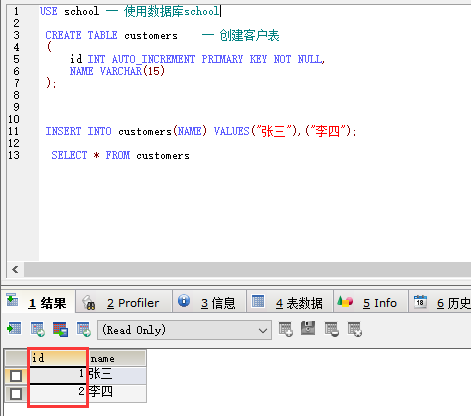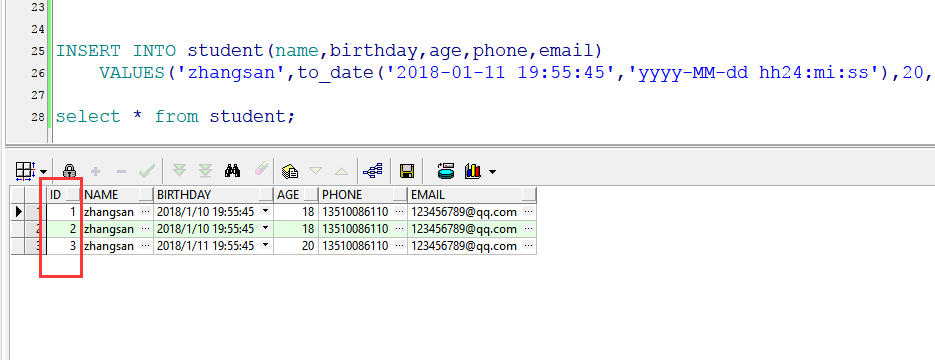1、MySQL
1.1、建表
auto_increment:每插入一条数据,客户表(customers)的主键id就自动增1,如下所示
1 create table customers -- 创建客户表 2 ( 3 id int auto_increment primary key not null, -- auto_increment:自增长 4 name varchar(15) 5 ); 6
1.2、测试(实例)
1 insert into customers(name) values("张三"),("李四");-- 向客户表中插入数据 2 3 select * from customers; -- 查询客户表

2、Oracle
2.1、建表
1 create table student
2 (
3 id number not null, -- 主键
4 name varchar2(20),
5 birthday date,
6 age number(20),
7 phone varchar2(60),
8 email varchar2(10)
9 )
10 alter table student add constraint student_pk primary key (id); -- 主键
2.2、创建序列
注:Oracle中的序列并不是和MySQL中的自增长一样,连续性的,而是跳跃、不连续性的。如要使他连续,则必须指定相关的属性和值。
1 /*
2 --创建序列Sequence
3 create sequence student_id
4 minvalue 1 --最小值
5 nomaxvalue --不设置最大值(由机器决定),或 根据表字段的值范围设置 maxvalue
6 maxvalue 99999999 -- 最大值
7 start with 1 --从1开始计数,数值可变
8 increment by 1 --每次加1,数值可变
9 nocycle --一直累加,不循环
10 nocache; --不建缓冲区。 如果建立cache那么系统将自动读取cache值个seq,这样会加快运行速度;如果在单机中使用cache,或者oracle死了,那么下次读取的seq值将不连贯,所以不建议使用cache。
11 */
12
13
14 -- 创建序列
15 create sequence student_id
16 minvalue 1
17 maxvalue 999
18 increment by 1
19 start with 1
20 nocycle
21 nocache;
Oracle sequence序列的创建、修改及删除 详解:http://www.cnblogs.com/dshore123/p/8269537.html
2.3、创建触发器 (以下三种方式都行)
格式:
create or replace trigger 触发器名 before insert on 表名 for each row when (new.表的自增长字段 is null) begin select 序列名.Nextval into:new.表的自增长字段 from dual; end;
1 -- 方式一
2 create or replace trigger tg_insertId
3 before insert on student for each row when (new.id is null) -- 当id为NULL时触发
4 begin
5 select student_id.Nextval into:new.id from dual;
6 end;
7
8
9 -- 方式二 (我比较喜欢这种)
10 create or replace trigger tg_insertId
11 before insert on student for each row
12 begin
13 select student_id.Nextval into:new.id from dual;
14 end;
15
16
17 -- 方式三
18 create or replace trigger tg_insertId
19 before insert on student for each row
20 declare -- 声明
21 -- 局部变量(student表里的字段)
22 begin
23 if updating then
24 insert into student
25 values(student_id.nextval,
26 :old.name, -- 对应student表中的字段
27 :old.birthday,
28 :old.age,
29 :old.phone,
30 :old.email
31 );
32 end if;
33 end;
2.4、测试(实例) 注:由于创建了触发器,所以下面的插入语句,不需要再写上id这一项
1 INSERT INTO student(name,birthday,age,phone,email) 2 VALUES('zhangsan',to_date('2018-01-10 19:55:45','yyyy-MM-dd hh24:mi:ss'),18,'13510086110','123456789@qq.com'); -- 插入数据
3
4 INSERT INTO student(name,birthday,age,phone,email) 5 VALUES('zhangsan',to_date('2018-01-11 19:55:45','yyyy-MM-dd hh24:mi:ss'),20,'13510086110','123456789@qq.com');
6
7 8 select * from student; -- 查询学生表
或者
1 insert into student(seq,name,birthday,age,phone,email) -- 这是带上“自增长主键(seq)”的写法 2 values(student_id.Nextval,'zhangsan',to_date('2018-01-10 19:55:45','yyyy-MM-dd hh24:mi:ss'),18,'13510086110','123456789@qq.com');

|
原创作者:DSHORE 作者主页:http://www.cnblogs.com/dshore123/ 原文出自:http://www.cnblogs.com/dshore123/p/8267240.html 欢迎转载,转载务必说明出处。(如果本文对您有帮助,可以点击一下右下角的 推荐,或评论,谢谢!) |